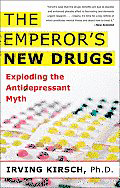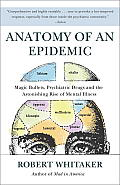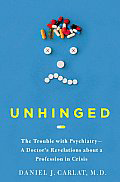 Health Notes this month gave you a small taste of how and why insanity is becoming one of our newest national products. Our
Health Notes this month gave you a small taste of how and why insanity is becoming one of our newest national products. Our  Book Spotlight will give you three ways to bite off a little more on the subject. As always, just click the link to be taken to the Powell’s Books website for the book.
Book Spotlight will give you three ways to bite off a little more on the subject. As always, just click the link to be taken to the Powell’s Books website for the book.
 The Emperor’s New Drugs: Exploding the Antidepressant Myth by Irving Kirsch
The Emperor’s New Drugs: Exploding the Antidepressant Myth by Irving Kirsch
Clinical psychologist Irving Kirsch has the world doubting the efficacy of antidepressants. Based on fifteen years of research, The Emperor’s New Drugs makes an overwhelming case that what the medical community considered a cornerstone of psychiatric treatment is little more than a faulty consensus. But Kirsch does more than just criticize: He offers a path society can follow to stop popping pills and start proper treatment. Kirsch draws on his research to relate how most improvements shown by depressed patients are due to the placebo effect, not antidepressants. He describes how he and one of his postgraduate students investigated the placebo effect in depression, which transformed his views about antidepressants, concluding that they don’t work. He details how many patients improved when given a placebo and how clinical trials that failed to show a benefit from taking antidepressants were withheld from publication. He also addresses the chemical-imbalance theory and lack of scientific evidence to support it, and alternatives to medication and the evidence for their effectiveness, to help patients and clinicians become better informed when making treatment choices.
 Anatomy of an Epidemic: Magic Bullets, Psychiatric Drugs, and the Astonishing Rise of Mental Illness in America by Robert Whitaker
Anatomy of an Epidemic: Magic Bullets, Psychiatric Drugs, and the Astonishing Rise of Mental Illness in America by Robert Whitaker
In this astonishing and startling book, award-winning science and history writer Robert Whitaker investigates a medical mystery: Why has the number of disabled mentally ill in the United States tripled over the past two decades? Every day, 1,100 adults and children are added to the government disability rolls because they have become newly disabled by mental illness, with this epidemic spreading most rapidly among our nation’s children. What is going on?
Anatomy of an Epidemic challenges readers to think through that question themselves. First, Whitaker investigates what is known today about the biological causes of mental disorders. Do psychiatric medications fix “chemical imbalances” in the brain, or do they, in fact, create them? Researchers spent decades studying that question, and by the late 1980s, they had their answer. Readers will be startled—and dismayed—to discover what was reported in the scientific journals.
Then comes the scientific query at the heart of this book: During the past fifty years, when investigators looked at how psychiatric drugs affected long-term outcomes, what did they find? Did they discover that the drugs help people stay well? Function better? Enjoy good physical health? Or did they find that these medications, for some paradoxical reason, increase the likelihood that people will become chronically ill, less able to function well, more prone to physical illness?
This is the first book to look at the merits of psychiatric medications through the prism of long-term results. Are long-term recovery rates higher for medicated or unmedicated schizophrenia patients? Does taking an antidepressant decrease or increase the risk that a depressed person will become disabled by the disorder? Do bipolar patients fare better today than they did forty years ago, or much worse? When the National Institute of Mental Health (NIMH) studied the long-term outcomes of children with ADHD, did they determine that stimulants provide any benefit?
By the end of this review of the outcomes literature, readers are certain to have a haunting question of their own: Why have the results from these long-term studies—all of which point to the same startling conclusion—been kept from the public?
In this compelling history, Whitaker also tells the personal stories of children and adults swept up in this epidemic. Finally, he reports on innovative programs of psychiatric care in Europe and the United States that are producing good long-term outcomes. Our nation has been hit by an epidemic of disabling mental illness, and yet, as Anatomy of an Epidemic reveals, the medical blueprints for curbing that epidemic have already been drawn up.
 Unhinged: The Trouble With Psychiatry- A Doctor’s Revelations About A Profession In Crisis by Daniel Carlat
Unhinged: The Trouble With Psychiatry- A Doctor’s Revelations About A Profession In Crisis by Daniel Carlat
In this stirring and beautifully written wake-up call, psychiatrist Daniel Carlat exposes deeply disturbing problems plaguing his profession, revealing the ways it has abandoned its essential purpose: to understand the mind, so that psychiatrists can heal mental illness and not just treat symptoms. He writes with bracing honesty about how psychiatry has so largely forsaken the practice of talk therapy for the seductive and more lucrative practice of simply prescribing drugs, with a host of deeply troubling consequences.
Psychiatrists have settled for treating symptoms rather than causes, embracing the apparent medical rigor of DSM diagnoses and prescription in place of learning the more challenging craft of therapeutic counseling, gaining only limited understanding of their patients’ lives. Talk therapy takes time, whereas the fifteen-minute “med check” allows for more patients and more insurance company reimbursement. Yet DSM diagnoses, he shows, are premised on a good deal less science than we would think.
Dr. Carlat shares a wealth of stories from his own practice and those of others that demonstrate the glaring shortcomings of the standard fifteen-minute patient visit. He also reveals the dangers of rampant diagnoses of bipolar disorder, ADHD, and other “popular” psychiatric disorders, and exposes the risks of the cocktails of medications so many patients are put on. Especially disturbing are the terrible consequences of overprescription of drugs to children of ever younger ages. Taking us on a tour of the world of pharmaceutical marketing, he also reveals the inner workings of collusion between psychiatrists and drug companies.
Concluding with a road map for exactly how the profession should be reformed, Unhinged is vital reading for all those in treatment or considering it, as well as a stirring call to action for the large community of psychiatrists themselves. As physicians and drug companies continue to work together in disquieting and harmful ways, and as diagnoses and misdiagnoses of mental disorders skyrocket, it’s essential that Dr. Carlat’s bold call for reform is heeded.










